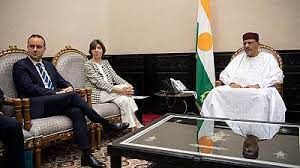On the verge of a diplomatic meltdown with Mali, France is strengthening its presence in Niger.
It’s a perfect all-enduring chemistry between Niger and former colonial power France.
On Wednesday 16 November, Paris offered two Gazelle combat helicopters and spare parts to Niamey to support its fight against jihadist groups active in the Tillaberi region.
According to Nigerien authorities, this logistical support is part of larger cooperation, worth 16 billion CFA francs, which has allowed for the training of pilots in combat flying and the use of guns for ten years.
The role of pilots is seen as decisive supporting ground forces, evacuations and reconnaissance flights.
“The authorities believe that such cooperation is necessary, France being one of Niger’s main partners both in terms of development aid and security issues, precisely in the context of the fight against terrorism,” journalist Aboubacar Yacouba Barma said.
At odds with the new authorities in Mali after ten years of presence in this Sahelian country plagued by a jihadist insurgency, France has decided to reposition nearly 2,000 of its soldiers from Operation Barkhane in Niger.
This redeployment has not been well received by some sections of Niger’s public opinion.
In November 2021, clashes left two people dead when a Barkhane logistics convoy was blocked in Tera, in western Niger, by demonstrators hostile to the French presence in the Sahel.
“In this context, these donations and support from France can be interpreted as a desire by the former colonial power to improve its image in Niger and in Africa,” says Aboubacar Y. Barma, who recalls that the former colonial power in the region “does not enjoy good press among natives, especially civil society organizations because it is perceived as a power whose companies exploit local natural resources without any real benefits for the population.”
Nigerien jurist Souwaiba Ibrahim puts things in a normative framework.
“France has been here since 2013. There has never been a falling out between Paris and the Nigerien authorities. On the contrary, ties have strengthened, despite the friction with Mali,” she says, acknowledging that the Nigerien authorities have taken the lead in “legalizing” the installation of French soldiers of the Barkhane operation in Niger.
“This means that the Nigerien authorities and France have acted to give a solid legal basis to this cooperation. They did not limit themselves to bilateral cooperation signed between the two governments. As if to say: look, this is legal (backed by law) and legitimate (approved by the representatives of the people),” the lawyer adds.
According to Souwaiba Ibrahim, it should be added to this the fact that “French soldiers do not do field missions alone as was the case in Mali.
“Here, they operate jointly with Nigerien soldiers. French soldiers always go on mission under the orders of a Nigerien command. And that’s a big difference from what they were doing in Mali,” she says.
From July to October, the Nigerien military staff reported about 15 joint operations with the French military in the west, which resulted in the arrest of some 30 jihadists.
This proximity to France does not prevent Niger from opening up to other partners.
Souwaiba Ibrahim observes that “President Bazoum is full of praise for all foreign military cooperation,” including Russia, with which “Niger has cooperation for the training of the Air force and the purchase of aircraft,” even if the Nigerien head of state, rules out any cooperation with the private military company, Wagner.
AC/cgd/fss/as/APA


